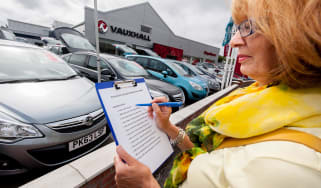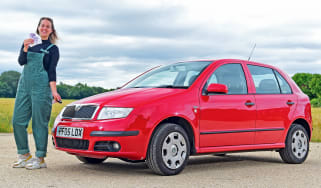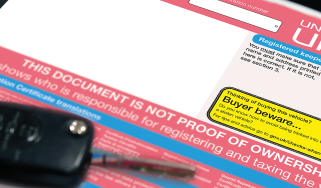Car buying scams to watch out for when buying a car
We explain everything you need to know about the most common car buying scams
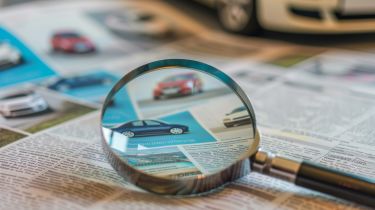
If you’re planning to buy a car, there are a number of tricksters out there who may try to con you out of your hard-earned cash. Car buying scams aren’t always easy to spot, but we’re here to help you identify and avoid falling victim to some of the more common schemes that the swindlers have cooked up.
Fake car adverts
With the rise of online marketplaces and car auction platforms, there’s a strong probability that you will come across at least one fake classified car ad during your search for a new car. In the majority of cases, these adverts list a car at a price that’s far lower than any other examples of the same car in a similar state of condition.
The fact is, though, that the advertised car simply doesn’t exist, and the pictures are often stolen from other adverts or platforms. Any unwitting buyers who respond to these ads will be coerced into sending money upfront, whether it’s the whole amount or a deposit. The scammer may also try to persuade the buyer to deal with them directly, rather than via the sales platform’s monitored messaging system.
A scammer's approach to extracting money from a victim may vary, but a common tactic is to say that the advertised car is located outside the UK (or at least several miles away from the buyer’s location). The unwitting buyer may then be sent to a fake website for a shipping company that claims to handle the money transfer and the shipping of the car.
Alternatively, the scammer may instead ask for money to reserve the vehicle or prove that the buyer is legitimately interested. It is extremely important to never hand over money for a car you haven’t seen in the metal, nor should you share your banking details with anyone at any stage. Any money that you do hand over to a fake advertiser is unlikely to ever be seen again, and any details you share are very likely to be used to commit identity fraud at a later date.
Any car advertised at a price well below market value should immediately set alarm bells ringing, doubly so if the vehicle turns out not to be located in the UK. Buying a car you have never seen from someone that you don’t know is a risky enterprise, and if you do choose to proceed, do so with extreme caution.
A telltale sign of a fake advert is a very vague description of the car, or the lack of one altogether. If you make contact with a seller and they ask for your details or any money upfront, walk away immediately. All the major money transfer organisations advise against using their services to move money to people you don’t know.
Fake car dealers
These scams are essentially a step up from fake car adverts. A scammer will pose as a non-existent dealership or car-selling website where multiple cars are advertised. Once again, these cars will appear to be very reasonably priced compared to the competition, but they simply won’t exist. In fact, many of the cars that are advertised through these schemes are copied from genuine ads which can be found elsewhere.
First the scammer will set up a website with a convincing appearance and business name. When an unsuspecting buyer then comes across this website and gets in contact about one of the cars, the fake dealer will then encourage paying in advance to secure the car. Unsurprisingly, once the money changes hands, the scammer usually disappears.
One of the easiest ways to verify that a car seller is legitimate is by doing a bit of research on the company name. If you can find no trace of the business anywhere else online (such as Companies House) this isn’t a good sign. If anyone else has previously fallen victim to that specific scam, they may warn about this on social media or online reviews. If you’re 100 per cent certain that the dealership is the real deal, you should still proceed with a little bit of caution. Never hand over any money until you’ve seen the car in the metal, make sure you’re happy with the overall condition, and double check that the dealer has the legal right to sell it in the first place.
Car cloning
Car cloning is where the identity (usually the number plate) of a fully road-legal car is illegally copied and then used to disguise an identical car that has previously been stolen or written-off. Cloned cars are often used for committing other illegal acts as they are harder to trace, and they can sometimes be found on the used car market.
Number plates are quite easy to copy, but the Vehicle Identification Number (VIN) is much more difficult to forge. Check the car’s number plates haven’t been tampered with, and that the registration number matches the one that’s associated with the VIN number that’s stamped on the vehicle. Also check that both numbers match the ones found in the car’s V5C log book. If the full V5C isn’t available or the numbers don’t match, it’s best to assume the worst.
Car ringing
Car ringing is a similar practice to car cloning, but here the falsely registered car is given the identity of another car that’s previously been written-off. The most obvious sign of this are VIN number stamps which have been tampered with in order to remove them or cover them over.
In order to spot a ‘ringer’, you will need to follow similar steps to those needed when looking for a cloned car, but here the VIN number stamps will have been tampered with, so look out for any sign of damage or interference. On top of this, keep an eye out for any resprayed bodywork.
Forged car documents
As with any legal documentation, there’s always the risk that a car’s paperwork may have been forged, especially if the car has been stolen. The document that’s particularly likely to be forged is the V5C logbook, so it pays to have a careful eye.
A genuine V5C document will have a DVLA watermark printed on it. This isn’t a 100 per cent guaranteed verification method, as a skilled forger may still be able to replicate this watermark, but it does at least partly reduce the risk of the document being fake.
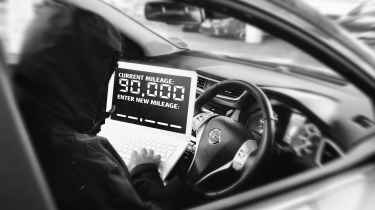
Car clocking and fake mileage
The term ‘clocking’ refers to the practice of adjusting a car’s odometer so that it shows a lower mileage than has actually been covered. The onset of digital odometers on cars means this dubious practice isn’t as common as it was, but that’s not to say it’s been eliminated.
While the latest instrument clusters are harder to tamper with, it can be done with the right tools. And with such a large number of cars now bought on finance deals with strict mileage limits, the motivation to artificially lower mileage is greater than ever. There are even companies who openly offer ‘mileage correction’ services online, and it has been estimated that as many as 2.5 million vehicles in the UK currently have incorrect mileages. The truth is that it’s not actually illegal to ‘clock’ a car, it’s simply against the law to sell a car without ‘declaring its genuine mileage’.
The best way to spot a clocked car is to do your research. First you need to check the MOT history, which can be easily done online and will show the recorded mileage at every test - if there are discrepancies, then alarm bells should ring. Alternatively, purchase an HPI check that will include this information and also check for any outstanding finance on the vehicle among other things. When viewing a car, carefully check the service history to make sure the recorded mileage tallies, plus look for signs of wear and tear that might indicate that the car has been more heavily used than the indicated mileage suggests.
DVLA scams
Scammers are fully aware that you need to pay your VED road tax when you purchase a new car, and you may receive a fake email, text message or telephone call that appears to be from the DVLA. The contents of these messages can vary, too, often taking the form of a reminder or a threat of legal action. No matter how legitimate the correspondence may look, though, the DVLA will never ask you to provide bank details or confirm your identity via these methods.
If you receive any digital or telephone correspondence that claims to be from the DVLA and is asking for money or confirmation of your personal details, automatically assume that it’s fake. If you need to pay your road tax or use any other DVLA services, the safest way to access these is via the GOV.UK website. If you think any correspondence is legitimate, you can also use GOV.UK to contact the DVLA directly and ask them to confirm. Never use any contact details or links that are supplied within the correspondence itself.
Did you know you can sell your car with Auto Express? Get the highest bid from our network of over 5,500 dealers and we'll do the rest. Click here to try Auto Express Sell My Car now...
Find a car with the experts




